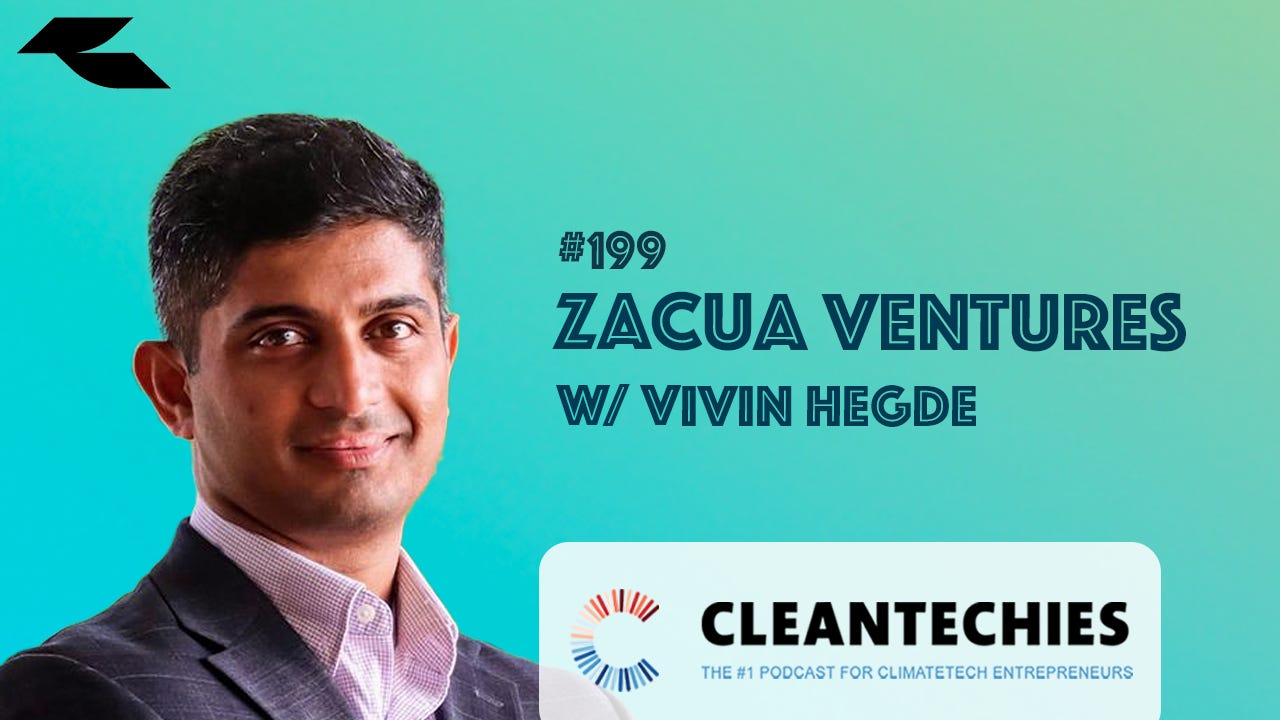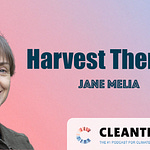What’s a construction worker’s favorite type of music?
Heavy metal!
🌎 Welcome back to CleanTechies
We are The #1 Podcast For ClimateTech Entrepreneurs.
Convo’s (x2) with top climate entrepreneurs each week 🎙️
In-depth takeaways for each ep to distill the core lessons 🙋
Companies to watch lists weekly(ish) 📝
Monthly show with Somil & Silas 🤓
ClimateTech Investor? Entrepreneur? Maybe an aspiring one? Service provider?
If what you do touches early-stage ClimateTech, this is the place for you. 🤝
Too busy to listen? Check out the transcript below 👇 (if you’re reading in email, check out the full transcript by reading on Substack)
Today, we are talking to Vivin Hegde of Zacua Ventures.
Vivin Hegde is a visionary in the built environment space — from leading innovation efforts at Hilti to co-founding Zacua Ventures, Vivin is on a mission to redefine how we think about construction and infrastructure.
In this episode, he dives deep into the challenges and opportunities of investing in the built environment, sharing his journey from managing corporate venture capital at Hilti to launching Zacua Ventures, where he backs early-stage startups focused on decarbonization, productivity, and infrastructure resiliency.
Vivin unpacks:
The importance of "gentle disruption" in the construction industry 🛠️
The strategic shift from corporate innovation to independent VC investing 💼
How global perspectives inform better investment decisions 🌍
The key traits he looks for in founders, especially in the construction tech space 👥
Convinced that you should know more about this? Well, you’re in luck. Tune in to todays episode to learn more…🎧💡
📺 Watch on YouTube | 🍎 Apple Podcasts | 🎧 Spotify | 🗣️ Join the Slack Channel
The Guest: Vivin Hegde
Vivin Hegde is the General Partner and co-founder of Zacua Ventures.
With a rich background spanning 6 years at McKinsey, and 8 years at Hilti, Vivin brings over a decade of experience in construction tech, industrial innovation, and corporate strategy.
At Hilti, Vivin played a pivotal role in driving innovation, leading global sales teams, and managing the Hilti-Trimble joint venture, where he spearheaded projects in robotics, software, and construction technologies.
Vivin is passionate about reshaping the built environment and leverages his deep industry expertise to support startups that are tackling decarbonization, productivity, and infrastructure resiliency challenges on a global scale.
The Company: Zacua Ventures
One Liner: A global venture fund driving innovation in the built environment by investing in early-stage startups focused on sustainability, productivity, and urbanization
Zacua Ventures focuses on transforming the built environment through strategic early-stage investments
They integrates deep industry expertise with strong corporate partnerships, offering startups access to global networks and resources to accelerate growth
Zacua is led by partners with more than 30 years of combined industry experience and who have been investing in construction tech for the past decade
With regional presence in San Francisco, Madrid and Singapore, Zacua helps entrepreneurs to build and strengthen their value proposition and scale their businesses globally, leveraging deep corporate networks
Got future guest suggestions or topics? Leave a comment!
Unable to support financially but still want to help? Share this post w/ 3 ClimateTech (or aspiring) entrepreneurs. Sharing is super helpful to us, and it costs you nothing.
📝 Show Notes:
Topics
02:04 Intro
03:08 Defining the Built Environment
04:56 Automation and Robotics in Construction
08:40 Sales and Building Relationships
24:59 Supporting Startups at the Earliest Stages
26:35 Investing Globally to Fund the Best Entrepreneurs
31:55 The Importance of Sector Specialization
42:53 The Role of Data Centers in the Digital Age
44:27 The Potential of Mass Timber in Construction
45:48 Addressing Challenges in the Design Space
47:22 Impressing Investors: Deep Understanding, Knowledge, and Learning Agility
Links
Connect with Somil on LinkedIn | Connect with Silas on LinkedIn
@Silas & @Somil_Agg on X
This podcast is NOT investment advice. Do your homework and due diligence before investing in anything discussed on this podcast.
Text Transcript 👇🏽
Somil Aggarwal:
Thank you for coming on. What time is it where I'm finding you? Are you based on the East Coast?
Vivin Hegde:
I'm based on the West Coast, and it's about 4 PM now.
Somil Aggarwal:
Okay, very cool. It's about 7 PM here. I'm very excited to be spending my evening on this because getting the chance to talk to you is very topical for me. The listeners know that I'm a huge built environment investor and enthusiast, and you guys have made some key investments, including one of our previous podcast guests, Pathways. So, it's a bit of a collision of worlds here, and I really appreciate having you on.
Vivin Hegde:
They had some good things to say about you, so I'm excited to be here.
Somil Aggarwal:
Amazing. High praise—I hope we follow it up. But before we get ahead of ourselves, please, I know who you are, but the audience doesn’t, so could you introduce yourself?
Vivin Hegde:
Sure! I'm Vivin Hegde, a General Partner at Zacua Ventures. We're an early-stage VC focused on the built environment. We invest from pre-seed to seed stages globally. I manage our investments in North America and India, while my partners are based in Madrid and Singapore. We also have team members in New York, Mexico, Dubai, Melbourne, and Madrid. I’m excited to be here and would love to talk about everything we do.
Somil Aggarwal:
Great! When you say you invest in the built environment, what does that mean to you? Because there are so many different definitions out there.
Vivin Hegde:
For me, the built environment includes anything around us that doesn’t move. It could be buildings—commercial, residential, infrastructure like roads, airports, data centers, or wastewater treatment plants. All of this is part of the built environment for us. Our focus extends from design and development to construction and operation. However, as a fund, we don’t spend much time on the prop tech side, such as mortgages and lending. Everything outside of that, though, is fair game for us.
Somil Aggarwal:
So, technology in the built space around us—I'm seeing that as the theme.
Vivin Hegde:
Exactly. And that includes supply chains, too. We look at supply chain decarbonization and productivity. We focus on areas like cement manufacturing, steel, glass, and everything else. It's all within our scope.
Somil Aggarwal:
That makes sense. So, clearly, you’re focused on decarbonization, productivity, and infrastructure. Just to give you some context, by the time this episode is posted, we'll have had a good run of built environment companies on the podcast. One of them you might have heard of—Urban Machine. They build a giant robotic arm to remove metal fasteners from wood to make it reusable.
One of the coolest things I learned from them is that there was a lot of iteration involved in making the robotic arm to reduce wear and tear on the machine. Do you generally agree that wear and tear is the biggest issue facing robotics? And what are you looking for when evaluating robotics in this space?
Vivin Hegde:
It really depends on what problem you’re solving. Wear and tear was crucial for Urban Machine because they're doing repetitive motion in their module, which required specific movements at certain angles. I've seen different versions of their robot over the years, and because they’re based nearby, I visit their facility often.
However, for a company like Dusty Robotics, which does layout robots, wear and tear isn’t the biggest issue. It's more about precision—how accurately they print and how precise the lines they’re printing are. For companies like Canvas, alignment and steadiness are bigger issues. For example, they find it challenging to install systems when there's a lot of drilling happening nearby. So, how do you ensure stability and alignment under those conditions? It’s very use-case dependent. For Urban Machine, wear and tear is a significant topic, but it’s not always the most important issue for every robotics company.
Somil Aggarwal:
That’s interesting. So, it really varies based on the specific problem the robotics solution is addressing.
Now, speaking more broadly, robotics and automation, especially in the built environment, are often seen as key solutions to labor issues—whether it’s labor cost, availability, or scalability of operations. As an investor, how close do you think we are to automating some of the labor required to build buildings, or even automating some of the processes in between? Are we still a few years out from seeing this hit the market?
Vivin Hegde:
As much as I like robotics, I’d say we’re getting closer, but we’re not there yet. We're making progress every day for a couple of reasons. First, the cost of robotics is coming down. Technology platforms like LIDAR, mobility, and payload systems are getting cheaper. Second, we're attracting more talent into this space, and labor is becoming more expensive. So, from a macro perspective, everything is trending in the right direction.
But there are still some bottlenecks. Today, we design for humans, not for robots. Construction sites are not yet optimized for robotic consistency and repeatability. Robots excel when they can perform a single task very well over a period of time. Eventually, we’ll get there, but we're still in the process of making that transition.
Somil Aggarwal:
That makes sense. Thanks for that perspective. We kind of jumped right into the deep end, so let’s take a step back. You’ve spent a lot of time in and around construction materials and tech. Your journey is super interesting because you did some cool things before joining Zacua Ventures that I'd love to talk about. But first, when you finished your six years at McKinsey, how did you decide to transition into the construction tech space?
Vivin Hegde:
To be honest, it wasn't a completely deliberate choice to focus on construction. It was partly coincidental. At McKinsey, I did a lot of work in infrastructure, oil and gas, mining, and similar sectors, so I was exposed to the space and had a good understanding of it. I had also worked on acquisitions for one of the largest construction players.
When I joined Hilti after McKinsey, it was as much an industrial play as it was a construction play. Hilti is an industrial company that needed someone with a management consulting background who understood the industrial sector. I was looking to join an industrial company with a global footprint, and Hilti fit that bill perfectly.
It just so happened that 95% of Hilti's products are sold into construction, so there was a significant overlap that helped me understand the space well. After two years at Hilti, I moved into sales and spent every day on construction sites, which fully immersed me in the industry.
…Tune into the episode for the rest 🎧💡
















Share this post